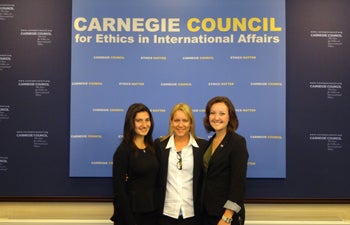Advocates for Ethics
When an earthquake and tsunami occurred in Futaba, Japan, in March 2011, there was a horrible ripple effect. Not only was the small coastal town devastated by the natural disaster, but the nearby Fukushima Daiichi Nuclear Power Plant’s resulting meltdown became known as the second worst nuclear accident after Chernobyl.
Because the nuclear reactor’s cooling systems were destroyed in the earthquake and tsunami, 400 tons of water have been pumped daily through the reactor’s tanks to cool them. In July 2013 came news that these tanks have been leaking thousands of gallons of irradiated water into the ocean.
Responsible for overseeing the emergency response to the nuclear fallout, the Tokyo Electric Power company has received a significant amount of funding from the Japanese government to repair the reactors. But protestors argue that an international task force should take over control of the nuclear site.
So who is ultimately responsible for ensuring that the health concerns of Japan’s citizens are addressed? What entity can stem the negative environmental effects?
Amanda Schmitt will investigate these ethical questions in an independent study project. The junior majoring in international relations with a minor in business recently presented her research proposal at the 2013 Global Ethics Fellows Conference in New York as an Ethics Fellow for the Future (EFF).
Hosted by the Carnegie Council for Ethics in International Affairs (CCEIA), the annual conference is a three-day series of panel discussions. During the conference, EFF fellows examine global challenges with students from around the world. Together, they discuss issues with scholars in the Carnegie Council’s Global Ethics Network — a group of academics from educational institutions around the world who explore the ethical dimensions of international affairs.
Schmitt will study the significance of the civil society response to the Fukushima nuclear disaster. She will look into what implications the response has for international norms regarding energy sources — for instance, will the crisis be the tipping point in a move away from nuclear energy? She will also examine what the international community can learn about effectively addressing a crisis that has an impact beyond sovereign borders to the global commons.
She said she learned from her peers’ presentations and the discussions helped her to build on her analytical skills.
“Having to respond to questions and counterpoints on-the-spot strengthened my ability to argue my viewpoint,” Schmitt said.

From left: Marissa Roy, Lyn Boyd-Judson and Amanda Schmitt at the Third Annual Global Ethics Fellows Conference. Photo courtesy of Amanda Schmitt.
Marissa Roy also attended as an EFF fellow. Roy is a progressive degree candidate pursuing a bachelor’s degree in philosophy, politics, and law at USC Dornsife and a master of public diplomacy through a joint program offered at USC Dornsife and the USC Annenberg School for Communication and Journalism. Her research focused on the United Nation’s Millennium Development Goals (MDGs), and its stipulation for monetary support from eligible countries to help see the goals through.
When the MDGs were established, the eight goals addressing poverty, health, education, hunger, and living conditions, stated that human rights of dignity, equality and equity were a collective responsibility. As the eighth development goal, 18 countries were asked to give 0.7 percent of their gross domestic product annually to help fund the other seven goals. However, since the MDGs were adopted in 2000, many countries, including the United States, are giving less to the aid fund than promised.
Roy argued that the United Nations must persuade nations to see the obligation for global distributive justice as more than charity. Rather, human rights should gain a status as international customary law and acceptance by national governments, especially those of the developed nations.
“If the UN is to continue such ambitious endeavors, and it should, it must begin to change opinion and law to inspire governments and individuals to assist the dying and suffering throughout the world,” she said.
EFF fellows are typically college students who have been nominated by a Carnegie Council Global Ethics Fellow to participate in the Global Ethics Fellows Conference. Schmitt and Roy were invited to the symposium by Lyn Boyd-Judson, a Global Ethics Fellow and director of the Levan Institute for Humanities and Ethics at USC Dornsife.
“Amanda and Marissa are both outstanding students who have research interests right on target for our work with the Carnegie Council,” Boyd-Judson said. “They both gave excellent presentations of their work and interacted thoughtfully and professionally with the group.”
Overall, Schmitt said the experience reinforced how critical it is to look at issues from multiple points of view.
“We were lucky to have fellows and mentees visiting from South America, Europe, Africa and Asia, so our discussions brought out varied perspectives and methods of analyses that were really eye-opening,” she said. “It made me cognizant about critically analyzing all parts of an argument to effectively question its assumptions.” Schmitt intends to hone her research over the next year.
“I truly enjoyed this experience,” she said. “What I learned I will apply in my studies and future research.”
In related news, the Carnegie Council’s Global Ethics Network has lauded Reid Lidow, a political science and international relations major, and USC Dornsife alumna Abigail Gregg, who earned her bachelor’s degree in English and anthropology in 2013. They were selected as finalists for the Carnegie Council’s 2013 Ethical Challenges in Trans-Pacific Relations Contest.